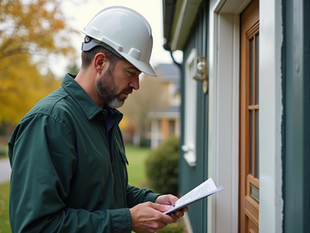
Why Every Houston Home Needs a Thorough Inspection
Oct 20, 2025
3 min read
0
2
0
Buying or owning a home in Houston comes with unique challenges and opportunities. The city's climate, age of housing stock, and local building practices all influence the condition of a property. This makes thorough Houston home assessments essential for anyone looking to protect their investment and ensure safety. A detailed inspection uncovers hidden issues, helps plan maintenance, and provides peace of mind.
The Importance of Houston Home Assessments
Houston homes face specific risks due to the region's weather patterns, including humidity, heavy rains, and occasional flooding. These factors can cause damage that is not always visible to the untrained eye. A professional home inspection evaluates the structural integrity, electrical systems, plumbing, roofing, and HVAC units to identify potential problems early.
For example, moisture intrusion can lead to mold growth, which affects indoor air quality and health. Termite infestations are also common in Houston and can severely weaken wooden structures. Without a proper assessment, these issues might go unnoticed until they become costly repairs.
Key benefits of Houston home assessments include:
Detecting safety hazards such as faulty wiring or gas leaks
Identifying water damage and mold risks
Assessing foundation stability in flood-prone areas
Evaluating roofing condition to prevent leaks
Providing a detailed report for negotiation or insurance purposes

What to Expect During a Houston Home Assessment
A comprehensive home inspection typically takes 2 to 4 hours depending on the size and age of the property. The inspector will examine both the interior and exterior, including:
Foundation and basement
Roof and gutters
Electrical panel and outlets
Plumbing fixtures and pipes
Heating and cooling systems
Windows and doors
Attic and insulation
Inspectors use specialized tools such as moisture meters, infrared cameras, and electrical testers to detect hidden problems. After the inspection, you will receive a detailed report with photos and recommendations.
It is important to attend the inspection if possible. This allows you to ask questions and get a better understanding of the home's condition. You can also learn about routine maintenance tips to keep your home in good shape.

How much does a home inspection cost in Houston?
The cost of a home inspection in Houston varies based on the size of the property and the scope of the inspection. On average, prices range from $300 to $500. Some companies offer additional services such as termite inspections or radon testing for an extra fee.
Investing in a professional inspection is a small price to pay compared to the potential costs of undiscovered repairs. For example, foundation repairs can run into thousands of dollars, and electrical issues can pose fire hazards.
To get the best value, choose a licensed and experienced inspector with good reviews. You can find reliable providers by searching for home inspection in houston.
Tips to save on inspection costs:
Bundle inspections (e.g., general and termite) with one company
Schedule inspections during weekdays for possible discounts
Ask for a sample report to ensure thoroughness

Common Issues Found in Houston Homes
Houston's climate and soil conditions contribute to several common home problems. Knowing these can help homeowners prioritize repairs and maintenance.
Foundation cracks and settling: Expansive clay soils cause shifting that damages foundations.
Roof damage: High winds and heavy rains can loosen shingles and cause leaks.
Plumbing leaks: Aging pipes and hard water lead to corrosion and leaks.
Mold and mildew: High humidity encourages mold growth in poorly ventilated areas.
Termite damage: Subterranean termites thrive in Houston's warm climate.
Electrical hazards: Outdated wiring and overloaded circuits increase fire risk.
Regular Houston home assessments help catch these issues early. For example, a small roof leak detected during inspection can be repaired before it causes interior water damage.
Maintaining Your Houston Home After Inspection
After receiving your inspection report, create a maintenance plan based on the findings. Prioritize safety-related repairs first, such as fixing electrical faults or addressing structural concerns.
Routine maintenance tips include:
Cleaning gutters and downspouts regularly to prevent water damage
Sealing cracks in the foundation and exterior walls
Scheduling HVAC servicing twice a year
Checking for signs of pests and treating promptly
Using dehumidifiers in basements and crawl spaces
Keeping a maintenance log helps track repairs and inspections over time. This documentation can increase your home's resale value and simplify future assessments.
Investing in thorough Houston home assessments is a smart decision for any homeowner or buyer. It protects your investment, ensures safety, and helps maintain your property’s value in the long run. Whether you are purchasing a new home or maintaining an existing one, a professional inspection is an essential step to avoid costly surprises.
For trusted and detailed inspections, consider scheduling a home inspection in houston with experienced professionals who understand the unique needs of Houston homes.






